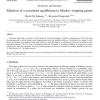Free Online Productivity Tools
i2Speak
i2Symbol
i2OCR
iTex2Img
iWeb2Print
iWeb2Shot
i2Type
iPdf2Split
iPdf2Merge
i2Bopomofo
i2Arabic
i2Style
i2Image
i2PDF
iLatex2Rtf
Sci2ools
EOR
2008
2008
Selection of a correlated equilibrium in Markov stopping games
This paper deals with an extension of the concept of correlated strategies to Markov stopping games. The Nash equilibrium approach to solving nonzero-sum stopping games may give multiple solutions. An arbitrator can suggest to each player the decision to be applied at each stage based on a joint distribution over the players' decisions according to some optimality criterion. This is a form of equilibrium selection. Examples of correlated equilibria in nonzero-sum games related to the best choice problem are given. Several concepts of criteria for selecting a correlated equilibrium are used.
Related Content
| Added | 10 Dec 2010 |
| Updated | 10 Dec 2010 |
| Type | Journal |
| Year | 2008 |
| Where | EOR |
| Authors | David M. Ramsey, Krzysztof Szajowski |
Comments (0)

